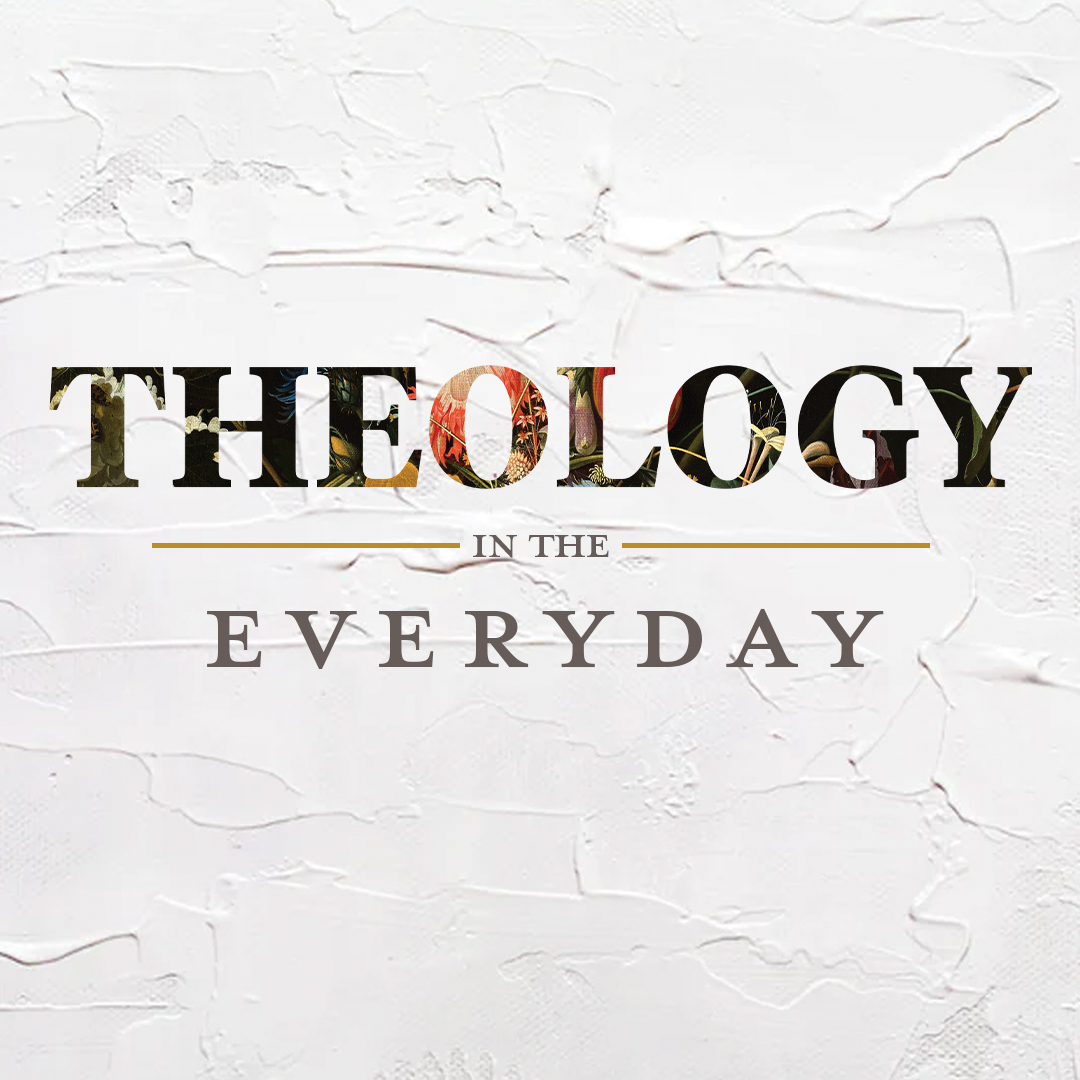When I was in 10th grade, the Power Team came to my church. They were a group of powerlifting Christians who went around from mega-church to mega-church, lifting weights and smashing bricks in order to bring “glory to Jesus.” I was excited to see them “perform/preach,” but I was mostly excited that my friends and I got to work out with the Power Team at Gold’s Gym one day between their nightly sessions. One of the members, Eddie “The Gripper” Dalcour, gave me some tips on which whey protein to drink after workouts. The highlight of the week came that night when Eddie “The Gripper” ripped not one but two phonebooks in half and everyone said, “Wow, how amazing!” Of course, the theme verse of the Power Team was Philippians 4:13: “I can do all things through Christ who strengthens me.”
This world of white, suburban, prosperity-gospel-lite, Ronald-Reagan loving evangelicalism was the world I grew up in. I could do anything through Christ who gave me strength. I knew I could do anything because God knew the plans that He had for me and they were plans to prosper me and not to harm me; they were to give me a hope and a future. Besides, even if something bad did happen, I knew that God worked all things together for good for those who loved Him and for those who were called according to His purpose.
What I most wanted to do at that time was play college football for a big SEC school. My dad had played college football for Auburn University and he was my hero. I wanted to be just like him. He hadn’t just been a great athlete, either. He was a great dad, a great husband and a great man, and he was the pastor of our church. The church had grown rapidly under his leadership, and it seemed like he had been able to do “all things through Christ.” He really didn’t have any weaknesses. So that is what I was going to do – I was going to be just like him. I was going to trust God, get tips from “The Gripper,” work hard, and I was confident that good things would happen and that, one day, I would be able to play college football in order to follow in my dad’s footsteps.
Between 10th and 11th grade, I got a lot faster, bigger, and stronger, and my dream of playing college football was beginning to become a reality. I played tight end on offense and middle linebacker on defense, and seven games into my junior season I was leading the whole city of Huntsville, Alabama in tackles. Schools from all over the country started calling and sending letters. In the eighth game of the season, I was chasing down a running back on a regular pitch play. In the midst of the tackle, I tore my right ACL and some meniscus cartilage in that knee. It was a big blow, but I knew the Lord had good plans for me. My faith was strong, and I knew God was going to use this bad thing for good. I had surgery on that knee, repairing the ACL and cartilage, and I immediately got back to work. Only this time I was working even harder than I had before. Fortunately, there was enough game film and enough on the stat sheet to keep the recruiting buzz high. Letters poured in that spring and schools began inviting me to visit them during spring games and to attend their summer camps. My rehab was going great, and I was bigger and stronger than ever. My dream of playing football in the SEC was becoming a reality.
But that May, another blow came. I was lifting weights one day and felt a strange sensation in my head, a “release” of pressure, as I was trying to push out one more rep. I asked my coach if you could tear an artery in your brain and he told me, “That’s called an aneurism and if that would have happened you would be dead.”
For the next few days I had a major headache but obviously wasn’t dead, so I just toughened up and went on with my life. Two days later, on a Friday, I was back in the weight room. After my first exercise, I blacked out and was overcome with pain from my head. After this, my coach told me to go home to see a doctor. That day, I went to my primary care doctor who immediately encouraged me to see a neurologist who did some tests and told me to come back on Monday for an MRI. I got a lot of rest that weekend and was really feeling better by Monday. I went in for the MRI, excited to get it done, finish up the day at school, and join my friends that afternoon for an end of school year pool party over at Katie Flynn’s house. As I was leaving the doctor’s office, they told me to come back later to get the results. This would make me a little late for the pool party, but I hoped it wouldn’t take too long.
When I went back to the doctor’s office, I learned that it wouldn’t be a short trip. The doctor had called both my parents and told us we had to go immediately to the hospital for one more test. The doctor saw something abnormal in the MRI. By this time ,I really was feeling fine – five days after the initial head pain – and I was a little annoyed that they were being so cautious. We went to Huntsville Hospital and, after a painstakingly long arteriogram, the doctors came out shaking their heads saying, “We can’t believe you walked in here today.”
They explained that I had a 2.5 inch tear in the basil artery of my brain. Arteries have two layers and, somehow, the interior layer of the artery had torn and the exterior layer was still intact. At first, I had no idea what this meant and my first question was, “When can I start training for football again?” One of the doctors told me that I would never play football again, and that he was worried I could have a full-blown aneurism or stroke. He told me I had to go on blood thinners immediately and that I couldn’t strain myself in any way. No walking faster than three miles per hour, no lifting more than ten pounds, and certainly no football.
Obviously, I was devastated. Those were the worst words I had ever heard, but I was a part of a loving community and somehow my faith was strong. I believed that “all things worked together for good” and I believed that “God had plans to prosper me and not to harm me, plans to give me a hope and a future.” My coaches, friends, and family members were incredibly supportive and kind to me during this season, and I persisted. I also learned a lot about prayer during this time as it seems like everyone I came in contact with that summer was praying for me.
Mine was such a rare case that the doctors didn’t really know what would happen, so the following September, I went back to the doctor to get another opinion to see if the tear had progressed. They did another arteriogram and this time, the doctors came out with huge smiles. My head was okay, there was no tear – whatever had happened was gone. I don’t know exactly what happened that summer, but I walked out of that doctor’s office believing that God had answered prayers and had given me a clean bill of health. I was going to be able to live a healthy and normal life.
Even though I was healthy, that injury ended my football dreams. All the schools that had been recruiting me stopped the recruiting process when they heard about my head injury and, because of the injury, I wasn’t able to finish the rehab on my knee. I was also in really bad shape. When you are used to eating 5,000 calories a day and suddenly stop all activity, it’s not a good combination. But I was grateful.
One dream had died, but I knew others would come.
In fact, the following spring, I was able to get back in shape, and I was thinking about walking on to play football at Auburn. My strength was back and my speed was slowly returning. But then, in a simple game of Ultimate Frisbee after church one Sunday, I tore my ACL again in the same knee. I was even wearing my brace which actually made the tear worse. I knew what happened as soon as it happened because it was the same pain I had felt 18 months before, but I didn’t have the heart to tell my parents. I was just about to go on a graduation trip to Colorado, so I hid the swelling and pushed through it. A few weeks later, I graduated high school and went out to Colorado for a week of mountain biking, rock climbing, river rafting and mountaineering.
It was a great trip. On the last day, I called home and got the sense from my mom that something was wrong at the house. After I pressed her, she finally put my father on the phone. Remember, my dad was my hero; he led me to Christ, he discipled me, he was my pastor and model in all things. But on the phone that night, he admitted to me that for the past several months, he had been having an affair and that he was going to have to resign from the church. In that moment, it would have been easier if someone would have told me that he was dead. I was so crushed, so hurt. He was the greatest guy I knew and now he had done this evil thing to my mother, to his church, to us, and to God. That night in Colorado was one of the worst and longest of my life. My family was in worse shape than my torn up knee, but somehow my faith survived.
Somehow I kept believing that God had good plans for me, that God would work out all things together for good.
Though my football dreams had been taken away and my family was collapsing, I went off to Auburn University with a sense of hope. God was going to do something through this. I had been the SGA president of my high school and I thought, “I will run for SGA president at Auburn and make an impact on this campus for the Lord.” If playing football or being a preacher’s kid wasn’t a secure platform, maybe campus involvement was. So, I joined a fraternity and a bunch of campus groups. Everything was looking up. My parents were working things out, my dad, who was repentant, was eventually able to pastor another church, I had another knee surgery to fix things, and it seemed that all of this was God’s plan.
My junior year rolled around and I announced that I was running for SGA president. I had a great little team of frat guys and sorority girls to help me. On the last day to announce your candidacy, a guy named Jonathan McConnell announced he was also running for SGA president. McConnell hadn’t been involved in SGA, so I really never saw this coming. At first I remember thinking, “Oh this guy is a no name on campus. He will be easy to beat,” until I realized that his dad was the president of the Republican Party in the state of Alabama. His dad had helped the governor at the time, Bob Riley, get elected just a few years before. Coincidentally, Jonathan (the son) ran for US Senate in 2016 and made it an interesting race against longstanding Alabama senator Richard Shelby. By this point you might have guessed, as sophisticated as my team of frat guys and sorority girls were, our little campaign had nothing on McConnell’s and I lost. But my faith was strong!
I believed that God knew the plans He had for me and that He was going to give me a hope and a future. I knew all things work together for good for those who love God and who are called according to His purpose.
I went on with my life. That summer I began dating a girl I had met. I remember thinking maybe this is what the Lord had in mind; maybe all of this happened so I could get connected with this great girl. Maybe this is the plan He had for me? About halfway through the next school year, she broke up with me. And in the spring of my senior year of college, as I was facing graduation not really knowing where my life was going and having had so many of my plans spoiled, my faith that had once been so secure began to shake.
I remember praying, “I thought you had good plans for me? I thought you were supposed to prosper me? I thought you weren’t going to harm me? I thought all things were supposed to work for good? Well, none of this feels good.” For the first time in my life, I felt far way from God. It seemed like I was laying my heart out on the line every time and coming up empty handed. I didn’t vocally reject Christianity or turn to drugs and alcohol, but I did just kind of feel numb to the things of God. If He was so good and so kind, why, despite my greatest efforts and consistent faith, was nothing working out? I was the kid who always kept his nose clean, had his act together, and tried to do the right thing.
Why wasn’t I prospering?
During that same spring semester in Auburn, I met an old pastor named Peter Doyle. He was retired, but he really enjoyed hanging out at coffee shops with college students and talking to them about Jesus. A buddy of mine and I started meeting with him and, as the Lord would have it, my attendance was a lot more consistent than my friend’s. It was on these days, when it was just Dr. Doyle and me, that I would tell him about my hurt and even about my numbing faith. The only thing he did in these moments was continue to teach me about Jesus. We were studying 1 John together, but Dr. Doyle just used the book as a spring board to the whole Bible. Through the weeks of meeting for coffee or burritos that spring, Dr. Doyle helped me see that my dreams were too small and my horizons too short. I had small dreams – playing college football and becoming the SGA president. Dr. Doyle helped me believe that God had dreams for me that were so much greater. He really did have good plans for me, and He really was going to work out all of these things for good, but I was reminded that none of that may happen in this life.
As we studied the Bible together, I realized that sometimes followers of God get notoriety and riches, but a lot of times they get dragged outside of the city and are stoned to death. As we studied God’s Word together, I started to really believe that things seem so hard in this world because none of us were meant for this world. My dreams had been too small and my horizons were far too short. God was and is working out all things together for good, but it may take ten thousand years for me to understand all of that.
I’m grateful for Christianity, I’m grateful for the church I grew up in, I am grateful for Christian music and good sermons, and good books and all that Christianity has produced. But that spring, a shift happened in my life. While I believe I was a Christian before, that spring I looked to Christianity less as something that would serve my dreams and desires, and I started looking more toward Christ. I started to see his power, goodness, and beauty more and more, and that he really was the same yesterday, today, and forever. That spring I took a step away from following Christianity and a step towards following Christ.
I wish I could tell you that since that time that faith has been simple and that fighting sin and doubt have been easy, but that is not the case. I can tell you, though, since that time I really have grown more and more to understand the story that God is trying to tell, and it is not my story, it’s His. I guess I could have told you that before that spring in Auburn, but it took disappointment and pain for me to really understand it. Since then, I’ve experience some pain, but to be honest, my life has been full of a lot of joy, too, and the Lord has given me kind gifts. I have an amazing wife and three beautiful children and, since the fall of that year that I met with Dr. Doyle, I have been pastoring churches, a job that brings me so much joy.
Epilogue:
I originally wrote this article in the fall of 2017 on the eve of planting a church, Christ Covenant, in Atlanta, Georgia. Since that time the church has done very well, and we have seen hundreds of people come to faith and many more grow in their love for the Lord. I often think about Dr. Doyle and his impact on my life and how I want to be a kind of Dr. Doyle to others. In fact, minutes before sitting down to write this epilogue I was on the phone with a young man who was struggling with his faith trying to ease his heart and mind by pointing him to the Word of God and prayer. Dr. Doyle went home to be with the Lord last week at the wonderful age of 93. He leaves behind many disciples, many men and women, to whom he displayed patience and kindness as he pointed them ever faithfully to follow the Lord. Dr. Doyle has now finished the race and he not only kept the faith, he helped others to do the same. The ministry of Dr. Doyle now lives on through them, and I am forever grateful to be counted in that number. I now understand all the more the lessons that Dr. Doyle taught me as a college student more than 20 years ago, and I know I will understand his lessons even better when I see him again one day face to face with joy in the presence of our Lord.


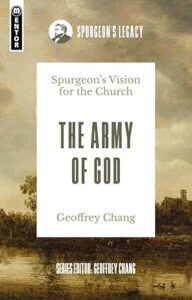 “The immortal Charles Spurgeon was many things—powerful preacher, fervent evangelist, fearless apologist, prolific author, and dynamic leader all rolled into one. But at the center of his ministerial heart was, perhaps, one virtuous gifting above all else— a devoted pastor. Indeed, so many of Spurgeon’s ministry pursuits and so much of his ministry influence flowed from his primary work of shepherding the flock of God entrusted to him. Spurgeon’s heart for the local church, and the ecclesiological convictions that undergirded it, are an enduring distinctive of the great man’s ministry. That’s why the 21st century pastor will benefit from studying Spurgeon’s ecclesiological convictions and well-documented pastoral ministry. And that’s also why I’m grateful for Geoff Chang’s The Army of God: Spurgeon’s Vision for the Church, in which he sets forth, in easy-to-read format, Spurgeon’s local-church convictions and practice. I heartily commend this book to all who serve God’s people. .”
“The immortal Charles Spurgeon was many things—powerful preacher, fervent evangelist, fearless apologist, prolific author, and dynamic leader all rolled into one. But at the center of his ministerial heart was, perhaps, one virtuous gifting above all else— a devoted pastor. Indeed, so many of Spurgeon’s ministry pursuits and so much of his ministry influence flowed from his primary work of shepherding the flock of God entrusted to him. Spurgeon’s heart for the local church, and the ecclesiological convictions that undergirded it, are an enduring distinctive of the great man’s ministry. That’s why the 21st century pastor will benefit from studying Spurgeon’s ecclesiological convictions and well-documented pastoral ministry. And that’s also why I’m grateful for Geoff Chang’s The Army of God: Spurgeon’s Vision for the Church, in which he sets forth, in easy-to-read format, Spurgeon’s local-church convictions and practice. I heartily commend this book to all who serve God’s people. .”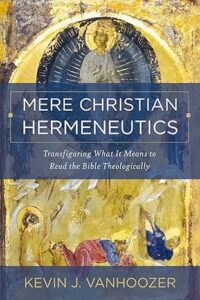 “Though conservative evangelicals have long affirmed the inspiration and inerrancy of Scripture, how to interpret Scripture remains an ongoing source of discussion and even debate. Kevin Vanhoozer’s Mere Christian Hermeneutics is a welcome contribution to this ongoing dialogue. Vanhoozer is a respected theologian and accomplished author who brings his considerable gifts to bear in this treatise on biblical interpretation. Whether you agree or disagree with Vanhoozer’s argument on reading the Bible theologically, all who seek to seriously engage the topic of biblical hermeneutics will benefit from his work.”
“Though conservative evangelicals have long affirmed the inspiration and inerrancy of Scripture, how to interpret Scripture remains an ongoing source of discussion and even debate. Kevin Vanhoozer’s Mere Christian Hermeneutics is a welcome contribution to this ongoing dialogue. Vanhoozer is a respected theologian and accomplished author who brings his considerable gifts to bear in this treatise on biblical interpretation. Whether you agree or disagree with Vanhoozer’s argument on reading the Bible theologically, all who seek to seriously engage the topic of biblical hermeneutics will benefit from his work.”
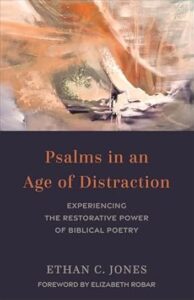 Ethan Jones clarifies, “This is not a book about digital media.” Indeed, it serves as a welcomed distraction from the devices that distract. This is a beautiful book about how the Psalms, as poetry, can teach, guide, shape the soul as well as shape churches. Jones, associate professor at New Orleans Baptist Theological Seminary, has written articles on this idea for a few years following service as a Visting Scholar at the University of Cambridge, and I am thrilled to see it come together in book form.
Ethan Jones clarifies, “This is not a book about digital media.” Indeed, it serves as a welcomed distraction from the devices that distract. This is a beautiful book about how the Psalms, as poetry, can teach, guide, shape the soul as well as shape churches. Jones, associate professor at New Orleans Baptist Theological Seminary, has written articles on this idea for a few years following service as a Visting Scholar at the University of Cambridge, and I am thrilled to see it come together in book form.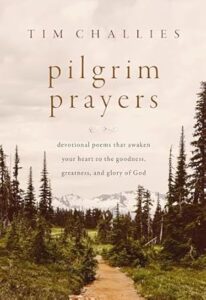 “While in seminary, a professor encouraged my preaching class to take up poetry to improve our preaching. Both tasks – poetry and preaching – give a sense of the significant with an eye towards style. Both tasks stir the heart and move the will. Thus, as a growing preacher myself, I was delighted to discover Tim Challies’ new book, Pilgrim Prayers. This book is filled with poem-prayers from prior generations. Each poem is accompanied with added commentary, devotional content, and Scripture reading. Whether you are a pastor hoping to improve your preaching or simply a Christ-follower looking for a new devotional, these poem-prayers will help you savor the Savior and declare his deeds. I hope you enjoy these wordy gifts as much as I have. (For a personal favorite from Challies’ selection, see “A Prayer of Confident Submission to God” authored by Christopher Newman Hall).”
“While in seminary, a professor encouraged my preaching class to take up poetry to improve our preaching. Both tasks – poetry and preaching – give a sense of the significant with an eye towards style. Both tasks stir the heart and move the will. Thus, as a growing preacher myself, I was delighted to discover Tim Challies’ new book, Pilgrim Prayers. This book is filled with poem-prayers from prior generations. Each poem is accompanied with added commentary, devotional content, and Scripture reading. Whether you are a pastor hoping to improve your preaching or simply a Christ-follower looking for a new devotional, these poem-prayers will help you savor the Savior and declare his deeds. I hope you enjoy these wordy gifts as much as I have. (For a personal favorite from Challies’ selection, see “A Prayer of Confident Submission to God” authored by Christopher Newman Hall).”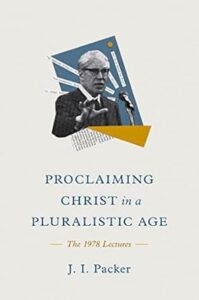 “These 1978 lectures published this year for the first time stand as yet another example of the treasure the late J.I. Packer was to evangelicalism. The subjects covered—Christ’s humanity and divinity, the biblical foundations of penal substitutionary atonement, the historicity and power of Christ’s resurrection—should not be the least bit controversial in the Christian tradition, but Packer’s careful responses to the challenges to these truths (and more besides) delivered more than 40 years ago are just as relevant and vital to gospel ministry today. Few write about such depth with such clarity and humility. This book, the best I’ve read in 2024, is a beautiful refresher on gospel doctrine that will serve us all well in an age of continuing drift and distraction.”
“These 1978 lectures published this year for the first time stand as yet another example of the treasure the late J.I. Packer was to evangelicalism. The subjects covered—Christ’s humanity and divinity, the biblical foundations of penal substitutionary atonement, the historicity and power of Christ’s resurrection—should not be the least bit controversial in the Christian tradition, but Packer’s careful responses to the challenges to these truths (and more besides) delivered more than 40 years ago are just as relevant and vital to gospel ministry today. Few write about such depth with such clarity and humility. This book, the best I’ve read in 2024, is a beautiful refresher on gospel doctrine that will serve us all well in an age of continuing drift and distraction.” “One of the greatest needs in our day of information overload is the Christian who can communicate truth in both personal and artful ways, adorning the beauty of the gospel with beautiful prose. As she reflects on her own careful cultivation of her garden in upstate New York, teacher and author (and occasional For The Church contributor) Andrea Burke’s tender and devotionally rich writing in A Bit of Earth will cultivate vital growth in your own heart. This is, quite simply, a beautiful book.”
“One of the greatest needs in our day of information overload is the Christian who can communicate truth in both personal and artful ways, adorning the beauty of the gospel with beautiful prose. As she reflects on her own careful cultivation of her garden in upstate New York, teacher and author (and occasional For The Church contributor) Andrea Burke’s tender and devotionally rich writing in A Bit of Earth will cultivate vital growth in your own heart. This is, quite simply, a beautiful book.” “Not only is Kevin DeYoung’s recent book Daily Doctrine a bulwark of truth for pastors and ministry leaders, it was a balm for my soul as well. Time would fail to mention just how broad a landscape DeYoung covers in this guide, and for fear of leaving off such important doctrines I wouldn’t dare begin to summarize. For me, the theological precision of his work on the doctrine of Christology, his biblical and historical sourcing for the doctrine of the Trinity, and his section on salvation was worth the price of the book by themselves. Many people may ask: ‘What’s the point of theology?’ Kevin DeYoung’s book responds by modeling what Andrew Bonar knew to be true: ‘Doctrine is practical, for it is that that stirs up the heart.’ Pick up this book and you’ll find yourself returning to its contents years down the road, for your own life and the life of your people.
“Not only is Kevin DeYoung’s recent book Daily Doctrine a bulwark of truth for pastors and ministry leaders, it was a balm for my soul as well. Time would fail to mention just how broad a landscape DeYoung covers in this guide, and for fear of leaving off such important doctrines I wouldn’t dare begin to summarize. For me, the theological precision of his work on the doctrine of Christology, his biblical and historical sourcing for the doctrine of the Trinity, and his section on salvation was worth the price of the book by themselves. Many people may ask: ‘What’s the point of theology?’ Kevin DeYoung’s book responds by modeling what Andrew Bonar knew to be true: ‘Doctrine is practical, for it is that that stirs up the heart.’ Pick up this book and you’ll find yourself returning to its contents years down the road, for your own life and the life of your people.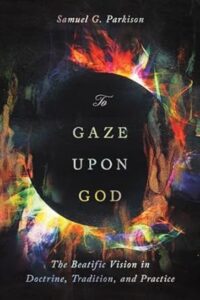 “Hans Boersma writes in his endorsement of Parkison’s book, ‘This is easily the best primer on the beatific vision today.” In other words, this is easily the best primer today on one of the most important doctrines for the Church. The beatific vision is the Christian’s hope of seeing God face to face—a doctrine which has been forgotten for far too long. Parkison’s book gives a comprehensive treatment of the beatific vision, from its biblical basis and historical foundation to retrieval in evangelicalism and application in the Christian life, in order to raise the Christian’s eyes to a hope far above the woes and wiles of our everyday experience. Read this book and be reminded and renewed in your hope of being with your God fully as we were always meant to be.
“Hans Boersma writes in his endorsement of Parkison’s book, ‘This is easily the best primer on the beatific vision today.” In other words, this is easily the best primer today on one of the most important doctrines for the Church. The beatific vision is the Christian’s hope of seeing God face to face—a doctrine which has been forgotten for far too long. Parkison’s book gives a comprehensive treatment of the beatific vision, from its biblical basis and historical foundation to retrieval in evangelicalism and application in the Christian life, in order to raise the Christian’s eyes to a hope far above the woes and wiles of our everyday experience. Read this book and be reminded and renewed in your hope of being with your God fully as we were always meant to be.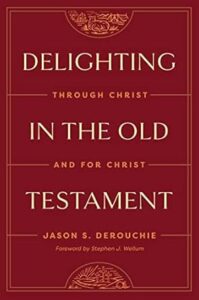 “When we behold Christ, we are transformed. In Delighting in the Old Testament, Jason DeRouchie shows us Christ throughout the pages of the Old Testament, transforming our understanding of the Old Testament to see its unified storyline that points to salvation in Jesus. DeRouchie presents a thorough, biblical case, carefully showing how the Old and New Testaments work together to proclaim Christ and are rightly understood in light of Him. DeRouchie also applies this foundation to interpret Old Testament laws and promises for believers today. Though his work is an excellent resource for students, his writing is accessible to a wide audience, with clear Scripture references and helpful graphics. Delighting in the Old Testament helps Christians read their Bible and see their Savior who loved them before the foundation of the world. In this way, the book is truly for the Church.”
“When we behold Christ, we are transformed. In Delighting in the Old Testament, Jason DeRouchie shows us Christ throughout the pages of the Old Testament, transforming our understanding of the Old Testament to see its unified storyline that points to salvation in Jesus. DeRouchie presents a thorough, biblical case, carefully showing how the Old and New Testaments work together to proclaim Christ and are rightly understood in light of Him. DeRouchie also applies this foundation to interpret Old Testament laws and promises for believers today. Though his work is an excellent resource for students, his writing is accessible to a wide audience, with clear Scripture references and helpful graphics. Delighting in the Old Testament helps Christians read their Bible and see their Savior who loved them before the foundation of the world. In this way, the book is truly for the Church.” “In no period of history has Christ abandoned His bride. Reclaiming the Dark Ages offers a testimony to that fact. Peering into the period of our history between the early church and the Protestant Reformation, a millennium often characterized as spiritually and intellectually lost, authors Iain Wright and Yannick Imbert give us a glimpse of the light of true faith enduring over the generations. Each chapter presents a biographical sketch of 10 key figures, including Boethius, Anselm of Canterbury, and John Wycliffe, and an account of each one’s contributions to theological orthodoxy. Though some readers may benefit from additional reading to fully appreciate the theological context and controversies in each figure’s story, the book is an accessible entry point to this period of Church history and an encouraging reminder of God’s faithfulness to build His Church.”
“In no period of history has Christ abandoned His bride. Reclaiming the Dark Ages offers a testimony to that fact. Peering into the period of our history between the early church and the Protestant Reformation, a millennium often characterized as spiritually and intellectually lost, authors Iain Wright and Yannick Imbert give us a glimpse of the light of true faith enduring over the generations. Each chapter presents a biographical sketch of 10 key figures, including Boethius, Anselm of Canterbury, and John Wycliffe, and an account of each one’s contributions to theological orthodoxy. Though some readers may benefit from additional reading to fully appreciate the theological context and controversies in each figure’s story, the book is an accessible entry point to this period of Church history and an encouraging reminder of God’s faithfulness to build His Church.”